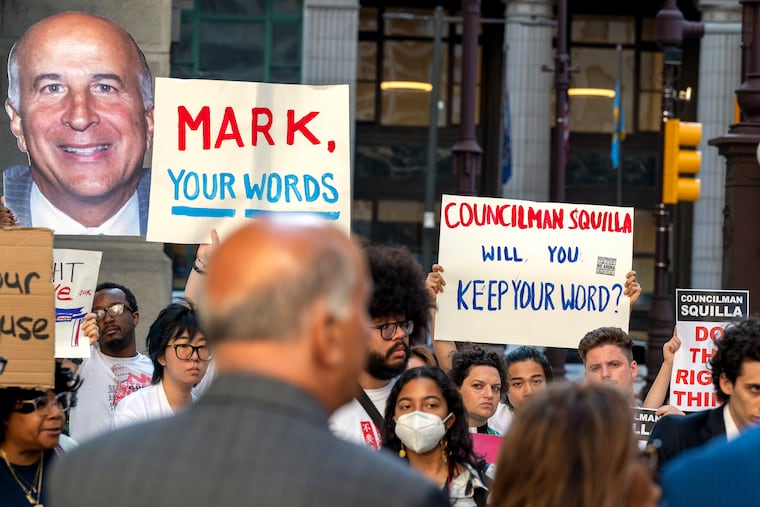Councilmember Mark Squilla proposes mandatory affordable housing in apartment construction in Chinatown
Squilla's bill would also protect small businesses by limiting the scope of new businesses to try to deter sports bars and chain restaurants.

Councilmember Mark Squilla promised in late October to legislate protections for Chinatown from displacement effects of the proposed 76ers basketball arena on East Market Street.
At the time, details were scant, but Thursday in City Council, Squilla unveiled a requirement that any housing project of 10 units or more would have to make 10% of the apartments available to people making up to 60% of area median income (about $47,000 a year).
The zoning bill would also ban smoking lounges, “adult-oriented services,” and assembly and entertainment uses, which means nightclubs. Under the proposed rules, new retail businesses could not exceed 3,000 square feet. That’s meant to block sports bars and chain restaurants from encroaching on Chinatown, although it would also make it difficult to open new dim sum halls or karaoke bars.
Squilla said the bill would stem other displacement pressures on the neighborhood, such as rising property taxes or rents associated with large projects like the arena, or the “Chinatown stitch,” which will cap part of the Vine Street Expressway north of the neighborhood.
“We’ve been talking about this for almost two years but never came out with a specific plan, so I think what the arena did was push us to do it,” Squilla said in October. “Because if this arena comes, you need it. But if the arena doesn’t come and it doesn’t pass, we need to do it anyway.”
The bill also would set a neighborhood building height limit of 65 feet, and no height or density zoning bonuses would be allowed unless a developer provided affordable housing in exchange.
Accessory parking lots would be banned from the neighborhood, too, as well as signs that aren’t advertising primary business uses in a specific building.
“You see the struggles of Chinatowns throughout the country and some of the hard times that Chinatown businesses have had since the pandemic,” Squilla said. “What can we do to offset some of the rise in real estate costs, the rise in taxes. ... So some of the people in the Chinatown community came up with ideas.”
John Chin, executive director of the Philadelphia Chinatown Development Corp. (PCDC), said he suggested that Squilla study anti-displacement efforts in San Francisco’s Chinatown, which adopted rules such as a 2,500-square-foot limit on new businesses. Chin also noted that he fears displacement pressures even if the arena does not move forward.
“We told the councilman what some of our issues are,” Chin said. “I think it helps, but I’m not sure if it’s enough to address our concerns about displacement.”
In October Squilla pressured the 76ers at the behest of some Chinatown advocates to remove a 20-story housing tower, which would have provided some below-market rate housing, from the arena proposal. A new plan coordinated with Mayor Cherelle L. Parker’s administration would compensate for those lost units with a 56-apartment project at 11th and Winter Streets, he said.
PCDC, which currently uses part of that parcel as a park, will develop the new building, Squilla said.
It’s going to be replaced with “real affordable housing,” where people in Chinatown can live, he said. “The mayor has committed to transferring that property to a community developer.”
Opposition to the arena in the neighborhood has been intense, and for many foes of the 76ers project, Squilla’s efforts to ameliorate potential displacement pressures are not enough.
”What Councilman Squilla is proposing for Chinatown is no more than a Band-Aid, and we have no idea how much it would even slow the bleeding,” said Xu Lin, owner of Bubblefish restaurant on Arch Street.